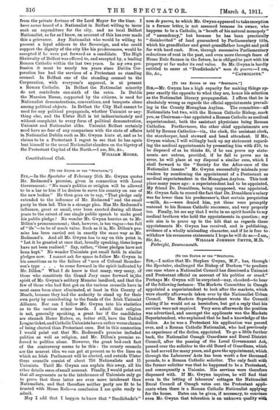[TO THE EDITOR OF THE "SPECTATOR."]
S I R, —In the Spectator of February 25th Mr. Gwynn quotes Mr. Redmond's promise, given in connection with Local Government : "No man's politics or religion will be allowed to be a bar to him if he desires to serve his country on one of the new bodies." He then goes on to say, "That pledge only extended to the influence of Mr. Redmond" and the small party he then led. This is a strange plea. Has Mr. Redmond's influence, great or small, ever been exerted during all these years to the extent of one single public speech to make good his public pledge ? No wonder Mr. Gwynn hurries on to Mr. Dillon's pronouncement ; that, however, is too vague—too full of "ifs "—to be of much value. Such as it is, Mr. Dillon's pro- mise has been carried out in exactly the same way as Mr. Redmond's. And all Mr. Gwynn has to say on this point is, "Let it be granted at once that, broadly speaking, these hopes have not been realised." Say, rather, "these pledges have not been kept." No wonder Unionists put small faith in similar pledges now. I cannot ask for space to follow Mr. Gwynn in his assertions as to the failure of "men of Colonel Saunder- son's type . . . to come forward in the spirit indicated by Mr. Dillon." What I do know is that many, very many, of those who constitute the Grand Jury came forward in:the spirit of Mr. Gwynn's solitary Munster landlord, and that the few of those who had first got on the various councils have in most cases been since eliminated, at least in this County of Meath, because they had the audacity to stand up for their own party by contributing to the funds of the Irish Unionist Alliance. Nor can I follow Mr. Gwynn into his statistics as to the various minor boards. I admit that religion is not, generally speaking, a great bar if the candidates are staunch Home Rulers, or, better still, have the United League ticket, and Catholic Unionists have a rather worse chance of being elected than Protestant ones. But in this connection I would point out that Mr. Redmond's promise included politics as well as religion, and Mr. Dillon's promise re- ferred to politics alone. However, the great bed-rock fact of the controversy seems to be this : the county councils are the nearest idea we can get at present as to the lines on which an Irish Parliament will be elected, and outside Ulster these councils consist of about 750 Nationalists and 15 Unionists. Until Mr. Gwynn can explain this away, all his other details seem of small account. Finally, I would point out that all arguments as to the intolerance of Unionists only go to prove that these latter are even more intolerant than Nationalists, and that therefore neither party are fit to be trusted with Home Rule—a conclusion I am quite ready to admit.
May I add that I happen to know that " Desdichado's" nom de guerre, to which Mr. Gwynn appeared to take exception in a former letter, is not assumed because its owner, who happens to be a Catholic, is "bereft of his natural monopoly" of "ascendency," but because he has been practically "disinherited" of land guaranteed by Parliamentary title, which his grandfather and great-grandfather bought and paid for with hard cash. Now, through successive Parliamentary reductions of rent in the past, and even more through fears of Home Rule finance in the future, he is obliged to part with his property at far under its real value. So Mr. Gwynn is hardly entitled to sneer at "Desdichado's" nom de guerre.—I am,










































 Previous page
Previous page